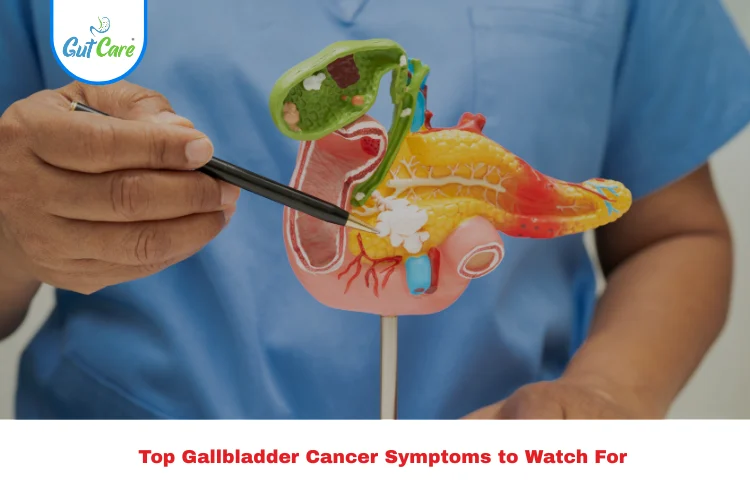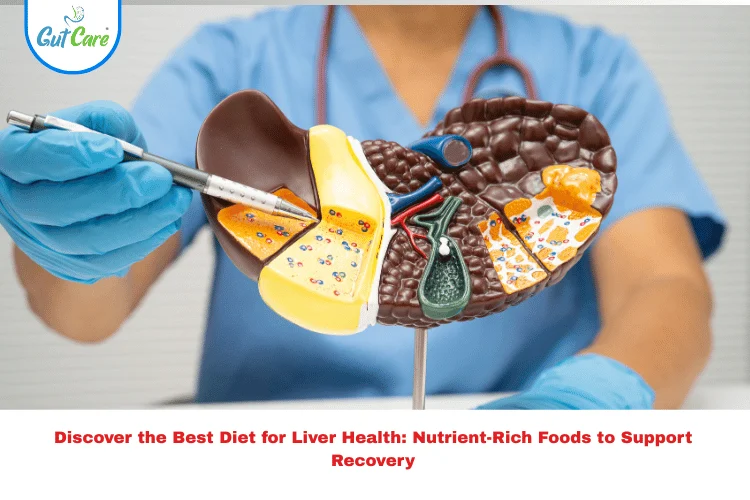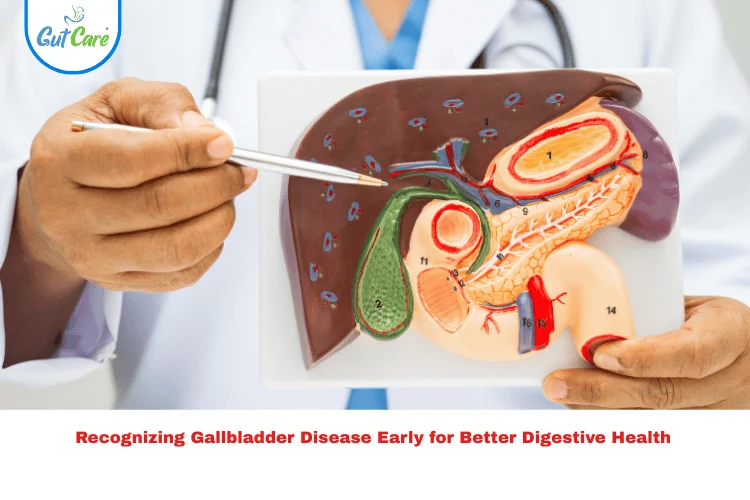Gallbladder cancer symptoms can often go unnoticed until the disease is in an advanced stage. Early signs may mimic common digestive issues, making them easy to ignore. That’s why knowing what to look out for—and when to seek expert medical help—is critical.
If you’re experiencing unusual abdominal pain, jaundice, or unexplained weight loss, it may be time to consult a specialist like Dr. Yuvaraj Singh Gehlot, a highly regarded gastroenterologist at Gutcare Clinics in Bangalore. Early intervention can greatly improve outcomes, especially when gallbladder cancer surgery is required.
In this guide, we’ll cover everything you need to know about symptoms, gallbladder cancer causes, home remedies for support, and when to get medical help.
What is Gallbladder Cancer?
Gallbladder cancer is a rare but aggressive disease that originates in the gallbladder—a small, pear-shaped organ beneath the liver that stores bile. Because it often doesn’t cause symptoms until it has spread, it’s considered one of the more challenging gastrointestinal cancers to detect and treat.
Common Gallbladder Cancer Symptoms
Detecting gallbladder cancer symptoms early can be challenging because many of them resemble less serious gastrointestinal conditions. However, persistent or worsening symptoms should never be ignored. Here’s a deeper look at the most common warning signs:
1. Abdominal Pain (Especially in the Upper Right Quadrant)
One of the earliest and most common symptoms is pain in the upper right side of the abdomen, just below the ribcage. This is where the gallbladder is located.
- What it feels like: A dull ache or sharp pain that can radiate to the back or right shoulder.
- Why it happens: As cancer grows, it can cause inflammation or blockages in the bile ducts, leading to pressure buildup and pain.
- When to worry: If the pain persists for more than a few days, gets worse after eating, or doesn’t respond to over-the-counter pain relief, seek medical advice.
2. Nausea and Vomiting
Unexplained nausea, especially when it’s not linked to food poisoning or other obvious causes, is another red flag.
- What it feels like: A lingering sense of queasiness, sometimes leading to vomiting after meals.
- Why it happens: Cancer can disrupt the gallbladder’s ability to release bile properly, affecting digestion and causing gastrointestinal upset.
- When to worry: If you’re feeling nauseous frequently and it’s accompanied by other symptoms like weight loss or jaundice.
3. Jaundice (Yellowing of Skin and Eyes)
Jaundice is a hallmark symptom of gallbladder and liver-related issues and should always be evaluated promptly.
- What it looks like: Yellowing of the whites of your eyes or your skin, along with dark urine and pale-colored stools.
- Why it happens: A tumor may block the bile ducts, preventing bile from being excreted properly and causing bilirubin to accumulate in the blood.
- When to worry: Immediate evaluation is necessary—jaundice typically signals a more advanced stage or an obstruction requiring treatment.
4. Unexplained Weight Loss
Losing weight without changing your diet or exercise routine is never normal and should always prompt a medical review.
- What it means: A loss of 10 pounds or more over a few months, especially when unintentional.
- Why it happens: Cancer can alter your metabolism and reduce appetite, while ongoing nausea and digestive issues also contribute to poor nutritional intake.
- When to worry: If weight loss is paired with fatigue, pain, or jaundice, consult a gastroenterologist immediately.
5. Lumps or Masses in the Abdomen
Though not always easily detectable, some patients may feel a lump under their right ribcage.
- What it feels like: A firm mass that may or may not be painful.
- Why it happens: This could indicate an enlarged gallbladder or liver due to tumor growth or bile buildup.
- When to worry: A physical exam or imaging test is required to confirm if it’s cancer-related or another gallbladder condition.
6. Bloating and Digestive Discomfort
General bloating, a feeling of fullness after eating small amounts, or indigestion may also be present.
- Why it happens: Cancer can disrupt normal bile flow, affecting fat digestion and causing bloating or gas.
- When to worry: These symptoms are common in many benign conditions, but when persistent and combined with others, they raise suspicion.
7. Fever and Chills
Less common but still significant, some patients report low-grade fevers.
- Why it happens: Inflammatory responses to the tumor or secondary infections (like cholangitis) may result in fever.
- When to worry: If fever occurs with jaundice or abdominal pain, it may indicate a bile duct infection and should be treated urgently.
8. Fatigue and Weakness
Feeling unusually tired or weak, even after rest, may occur in more advanced stages.
- Why it happens: Cancer affects your body’s energy levels and immune system. Poor appetite and malabsorption also contribute to fatigue.
- When to worry: Ongoing fatigue, especially with other symptoms, should prompt a full diagnostic workup.
Gallbladder Cancer Causes
Understanding gallbladder cancer causes can help assess your risk level. Several factors may contribute:
- Gallstones: Chronic inflammation from gallstones is the most common link.
- Obesity: Increases overall cancer risk.
- Infections: Repeated gallbladder infections (cholecystitis) raise risk.
- Age and Gender: Women and people over 65 are more affected.
- Family History: Genetic predisposition can play a role.
When to See a Gastroenterologist
If you’re experiencing one or more of the above symptoms for more than two weeks, don’t delay. Reach out to a specialist like Dr. Yuvaraj Singh Gehlot, leading gastroenterologist at Gutcare Clinics in Bangalore.
A timely consultation can lead to early diagnosis—improving treatment outcomes significantly. If needed, you may be evaluated for gallbladder cancer surgery, radiation, or chemotherapy based on your condition.
Diagnosis and Treatment Options
How It’s Diagnosed
- Ultrasound or CT Scans: To detect gallbladder irregularities.
- MRI or MRCP: Provides detailed bile duct images.
- Blood Tests: Liver function tests may show abnormalities.
- Biopsy: Confirms cancer diagnosis.
Treatment Approaches
- Gallbladder Cancer Surgery: In early stages, surgery to remove the gallbladder and nearby tissues can be curative.
- Radiation Therapy: Helps shrink or kill remaining cancer cells post-surgery.
- Chemotherapy: Used when cancer is advanced or inoperable.
- Targeted Therapy: Newer treatments may focus on specific cancer mutations.
Summary
If you or a loved one is experiencing gallbladder cancer symptoms—such as abdominal pain, jaundice, or weight loss—it’s vital to act quickly. While supportive remedies can offer some relief, only a medical expert can confirm the diagnosis and guide you toward the right treatment.
Early diagnosis saves lives. Contact Gutcare Clinics in Bangalore and book an appointment with Dr. Yuvaraj Singh Gehlot for expert evaluation and personalized care.
FAQs – Gallbladder Cancer Symptoms
1. What are the initial indicators of gallbladder cancer?
The most frequently reported early symptoms of gallbladder cancer are pain in the upper right abdomen, nausea, jaundice and unexplained weight loss.
2. Is surgery an option for gallbladder cancer?
Yes. Surgery for gallbladder cancer is often considered the primary treatment than other options, particularly if it is caught early enough and has not spread.
3. What are the primary contributors to gallbladder cancer?
The most common causes of gallbladder cancer include chronic gallstones, chronic inflammation caused by long-term infections, obesity, and family history of gallbladder disease.
4. When should I make an appointment with a gastroenterologist regarding gallbladder symptoms?
You should make an appointment with a facility such as Gutcare Clinics to see Dr. Yuvaraj Singh Gehlot for the gallbladder symptoms if the symptoms are not disappearing after 2 weeks, or there are signs of jaundice, abdominal pain or vomiting.
5. Why should Gutcare Clinics in Bangalore, be considered for gallbladder problems?
Gutcare Clinics is well known in the market for gallbladder problems including both positive and malignant conditions under the clinical leadership of Dr. Yuvaraj Singh Gehlot, who specifically specializes in the study of gastroenterology, primarily gallbladder disorders and cancer care.




